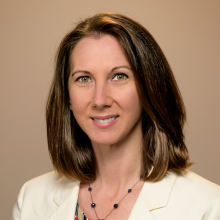August 2015 Federal Policy Fellow Spotlight: Lynlee Tanner Stapleton, Ph.D.
2014-2015 Federal Executive Branch Policy Fellow
As a second year SRCD Executive Branch Policy Fellow and clinical psychologist placed at the U.S. Agency for International Development (USAID), I have had the fantastic opportunity both to enrich and expand my topical expertise related to child development and to build a deeper understanding of how the U.S. government develops and implements programs to achieve strategic priorities. In this column, I present some specific examples of how I have applied my background to the objectives of my host office and reflect on my professional development over the past two years.
My position is housed in the Center for Development Innovation of the U.S. Global Development Lab, a new entity within USAID that is dedicated to infusing science, technology, innovation, and partnerships into the international development enterprise in order to achieve greater impact on global poverty. Over the past two years, I have worked closely with the Center on Children in Adversity and the Cambodia field office to design and launch a new program that uses a collaborative, systems-based approach to solve problems related to children without appropriate, protective, and permanent family-based care. This has provided a unique opportunity for me to combine different areas of my technical expertise, from both research and clinical perspectives, and apply it in a new context. I have also found parallels between the process of planning and delivering individual-level clinical assessments and interventions and the process of project design to achieve systemic change. One exciting area of growth has been bringing general methodological skills to bear on our efforts to infuse rapid assessment and feedback loops into project implementation plans so that interventions can be quickly adapted in response to produce better results.
In addition, I have had many opportunities to be a more general scientific analyst and experimenter within the Lab. This ranges from using my perspective as a psychologist to think through the motivations and incentives of different stakeholders during the process of program design, to guiding discussions about construct measurement and indicators, to identifying and sharpening innovative methods and approaches for achieving better program impact. General project management and cross-sectoral relationship building skills have also been essential to keeping projects alive and moving forward.
I feel immensely grateful to the fellowship program for allowing me the chance to step into a rather new and unfamiliar role and to expand the scope of what I thought possible given my background and training. At the same time, I have recognized many seemingly hidden similarities and common threads across sectors and actors that all aim to improve the wellbeing of children and their families. The multidisciplinary, inclusive, and forward-thinking community fostered by SRCD through the fellowship has provided an enriching professional home and support system from which to build valuable expertise and explore new professional avenues.
